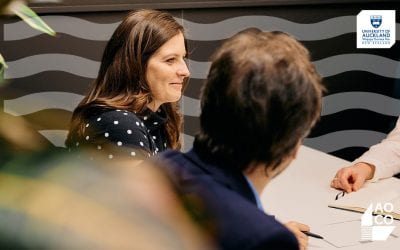Stroke Rehabilitation (Online)
Explore the key components of stroke rehabilitation from a multidisciplinary perspective. Apply NowTalk to an AdvisorStroke Rehabilitation (Online)
Explore the key components of stroke rehabilitation from a multidisciplinary perspective. Apply NowTalk to an AdvisorMEDICAL & HEALTH SCIENCES
Stroke Rehabilitation (Online)
Certificate of Proficiency | Contributes to PGDipStrokeCare
Explore the key components of stroke rehabilitation from a multidisciplinary perspective with this 30-point credit bearing course comprising 6 fortnightly modules.
Recommended Background
Students will have a bachelors degree in a relevant subject
University Entrance (or equivalent) required for admission
Duration
12 weeks
Next Start Dates
21 July 2025 (Semester Two)
Applications close one week before the course starts. Enrol early to secure your spot.
Domestic Fees*
$2,723.10 (estimate)
Disclaimer: *Fees are inclusive of 15% GST, but do not include the Student Services Fee, course books, travel and health insurance, or living costs. Amounts shown are indicative only. In addition to the tuition fee, there is a Student Services Fee of $4.44 per point (online). Fees will be confirmed upon completion of enrolment into courses.
Why is this course right for you?
This course is part of the Postgraduate Diploma in Stroke Care (PGDipStrokeCare) and may also be taken as a course-only study option. Designed with busy clinicians in mind, it covers the key components of stroke rehabilitation from a multidisciplinary perspective. The aim of the course is to develop an evidence-based understanding of the biological processes of recovery after stroke, and interdisciplinary knowledge of the assessment and treatment of the impairments commonly caused by stroke.
Students taking the course come from a range of backgrounds, and have different levels of experience with stroke – from just starting to build their knowledge, to several years of experience. This diversity supports rich discussions about the material, with everyone’s perspectives and experiences welcome.
Upon completion, students who wish to progress their studies further towards a formal qualification may count this course towards the Postgraduate Diploma in Stroke Care (entry criteria and time limits apply).
In this course you will develop knowledge of the biological processes underpinning neurological recovery after stroke. You will also develop interdisciplinary understanding of assessment and interprofessional treatment strategies for impairments in communication, swallowing, vision, sensation, cognition, continence, and movement. Skills in assessing independence and participation using standard scales will be also be developed for application in clinical practice.
Course |
Description |
||
| Teamwork and spontaneous biological recovery | In this module, you will learn about what makes a high-performing team within healthcare settings. You will cover ideas that can be applied generally to healthcare teams, in a variety of settings across the care continuum. This module is also about the biological processes that occur in the brain after stroke, and how these contribute to recovery. It will help you understand how your work interacts with these processes, and what to say about the recovery process to patients and whānau. | ||
| Movement, sensation, and continence | This module is about understanding how movement, sensation and continence are affected after stroke. These topics will cover what we know about the recovery of movement and sensation, common assessments, and management strategies. It will also cover the different types of urinary incontinence, assessment, and management principles. | ||
| Swallowing and nutrition | In this module, you will explore the management of swallowing and nutrition in the rehabilitation stages of stroke. Establishing safe feeding plans is crucial to reducing the risk of chest infection early after stroke. Optimising nutrition is important after stroke to ensure patients are adequately nourished and hydrated to cope with the demands of rehabilitation. It is also important to consider dietary education that can lower future stroke risk. | ||
| Cognition and communication | In this module, you will look at the assessment and management of cognitive difficulties after stroke. Cognition is a broad term that can consider many different ‘cognitive syndromes’. You will also explore common post-stroke cognitive syndromes, assessment tools and rehabilitation approaches. You will also cover rehabilitation of communication after stroke. | ||
| Vision | This module describes the assessment and management of visual deficits produced by stroke, including detection, treatment options, care pathways and support. | ||
| Goal setting and preparing for discharge | In the final module of the course, you will explore contemporary models of patient centred goal setting and how these can be applied to clinical practice. We will also cover preparing for discharge from rehabilitation services. |
Programme Structure
In this course you will develop knowledge of the biological processes underpinning neurological recovery after stroke. You will also develop interdisciplinary understanding of assessment and interprofessional treatment strategies for impairments in communication, swallowing, vision, sensation, cognition, continence, and movement. Skills in assessing independence and participation using standard scales will be also be developed for application in clinical practice.
Teamwork and spontaneous biological recovery
In this module, you will learn about what makes a high-performing team within healthcare settings. You will cover ideas that can be applied generally to healthcare teams, in a variety of settings across the care continuum. This module is also about the biological processes that occur in the brain after stroke, and how these contribute to recovery. It will help you understand how your work interacts with these processes, and what to say about the recovery process to patients and whānau.
Movement, sensation, and continence
This module is about understanding how movement, sensation and continence are affected after stroke. These topics will cover what we know about the recovery of movement and sensation, common assessments, and management strategies. It will also cover the different types of urinary incontinence, assessment, and management principles.
Swallowing and nutrition
In this module, you will explore the management of swallowing and nutrition in the rehabilitation stages of stroke. Establishing safe feeding plans is crucial to reducing the risk of chest infection early after stroke. Optimising nutrition is important after stroke to ensure patients are adequately nourished and hydrated to cope with the demands of rehabilitation. It is also important to consider dietary education that can lower future stroke risk.
Cognition and communication
In this module, you will look at the assessment and management of cognitive difficulties after stroke. Cognition is a broad term that can consider many different ‘cognitive syndromes’. You will also explore common post-stroke cognitive syndromes, assessment tools and rehabilitation approaches. You will also cover rehabilitation of communication after stroke.
Vision
This module describes the assessment and management of visual deficits produced by stroke, including detection, treatment options, care pathways and support.
Goal setting and preparing for discharge
In the final module of the course, you will explore contemporary models of patient centred goal setting and how these can be applied to clinical practice. We will also cover preparing for discharge from rehabilitation services.
Course Benefits
Students who complete this course will be able to:
1. Describe the biological processes of recovery after stroke including their timeline
2. Evaluate the strengths and limitations of clinical assessment tools used to evaluate impairments in communication, swallowing, vision, sensation, cognition, mood, continence, and movement
3. Select appropriate clinical assessment tools for a range of clinical scenarios
4. Use the results of clinical assessments to identify key elements of rehabilitation plans
5. Assess independence and participation in life roles using standard scales
6. Analyse how the interdisciplinary team can work together with the patient to help them achieve their goals
Upon successful completion of the course you will:
* Be awarded with 30 credit points from the University of Auckland
* Have the option to take your credit into the PGDipStrokeCare (entry criteria and time limits apply)
Frequently asked questions about this course
Application FAQs
What are the entry requirements?
This course is for students with a bachelors degree in a relevant subject. Relevant subjects include include clinical exercise physiology, counselling, dietetics, medicine, nursing, nutrition, occupational therapy, optometry, paramedicine, pharmacy, physiotherapy, psychology, social work and speech language therapy. Please note that for admission you must meet the requirements to study at a New Zealand University (e.g. through University Entrance or an alternative entrance pathway).
What is the date for the next intake?
The next start date for this course is Monday 17 July 2023. Applications close one week before the course starts. Enrol early to secure your spot.
Is the course fee a one-off lump sum?
Yes, the course fee is a one-off sum of $2,624.70 for domestic students.
Is this course open to non-resident students?
No. Currently Auckland Online Certificates of Proficiency are only open to NZ citizens and permanent residents.
Studying FAQs
Can I study the course in my own time? Is it suitable for those working full-time?
Yes. You can study at a time that suits you (within the allocated course dates). Auckland Online courses are designed for working professionals. They are flexible yet structured to help you gain the knowledge in the time you have.
How is the course structured?
The course will run over 12 weeks (with a break in the middle), and will comprise 6 fortnightly modules. Further details on the course structure can be found under the ‘Course Structure’ tab further up on this page.
Assessment FAQs
How will I be assessed?
Learners will be assessed through four assignments that address the learning objectives from each of the modules in the course. There is no final examination.
Benefits FAQs
What is a Certificate of Proficiency (CoP)?
A Certificate of Proficiency (CoP) is a course-only study option that allows you to take a course at the University of Auckland, without studying a full programme. It is a good option for those who want to study short-term, or to test whether a subject is something they wish to pursue more of in the future.
Does the course enable me to take further study at the University?
If you decide to progress your studies further towards a full qualification, you can apply to reassign the points from your CoP to the PGDipStrokeCare (entry criteria and time limits apply).
How many course credits will I attain upon completion of the course?
Upon completion of the course, you will be awarded with 30 credit points from the University of Auckland.
Do I get a certificate at the end?
As a Certificate of Proficiency is not a formal qualification, you will not be able to graduate with it or receive a graduation certificate. Your results will be recorded on your official academic transcript, providing evidence of your study.
Start Your University Application
Before we transfer you to the University of Auckland application portal to start your application, we would like to capture a few details.
These details enable us to provide you with ongoing information about this course, including exciting updates or any upcoming webinars. Our advisors may also contact you to see if you require any personalised advice to guide you through the application process.
* indicates a required field
What Scholarships Am I Eligible For With 100% Online Study?
If you’re feeling stuck in your job or you’re simply looking for a new challenge, a career change can shake things up and find your passion. But before you make the leap, here are a few things you need to think about!
How to Get Employer Funding for 100% Online Postgraduate Programmes & Courses
If you’re feeling stuck in your job or you’re simply looking for a new challenge, a career change can shake things up and find your passion. But before you make the leap, here are a few things you need to think about! We explore the reasons why employers should sponsor their employees’ postgraduate study and how employees can secure funding from their employers.
What Types of Student Loans Am I Eligible For With 100% Online Study?
Embarking on postgraduate study can be a big decision, with personal finances to take into consideration. You could be eligible for a student loan via Studylink if you enrol in an Auckland Online programmes.




